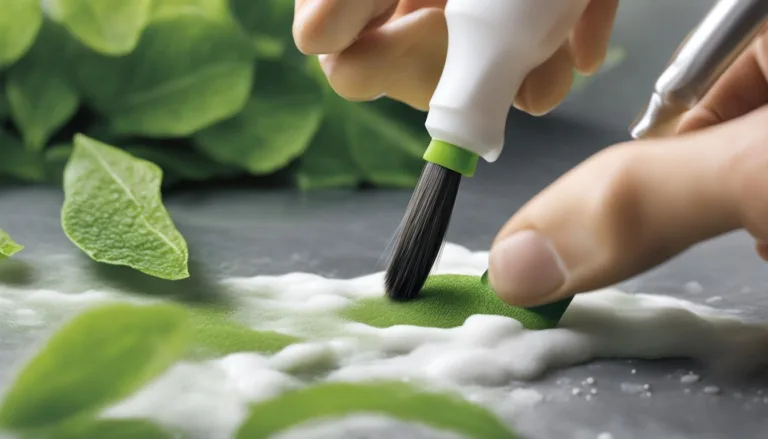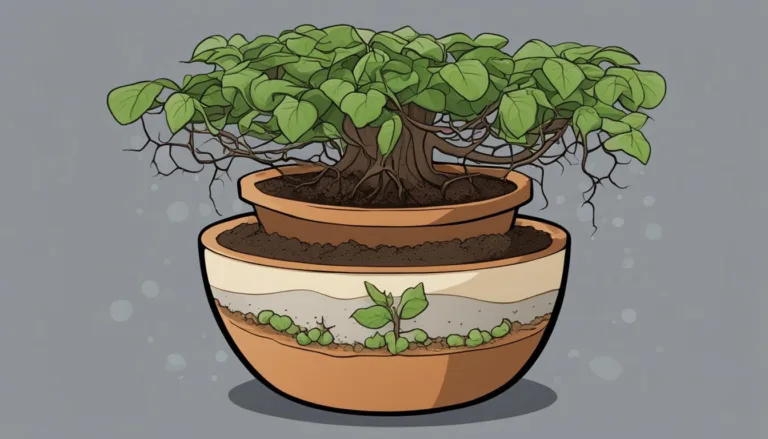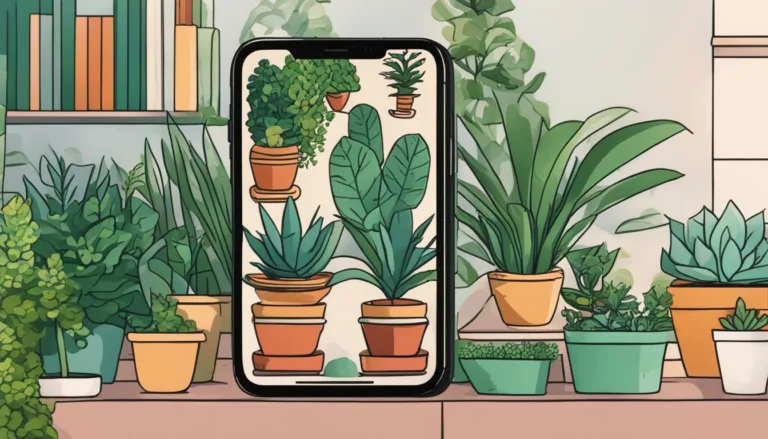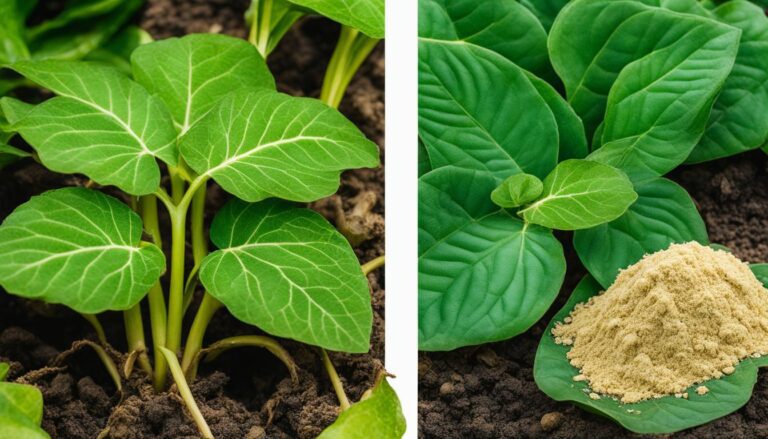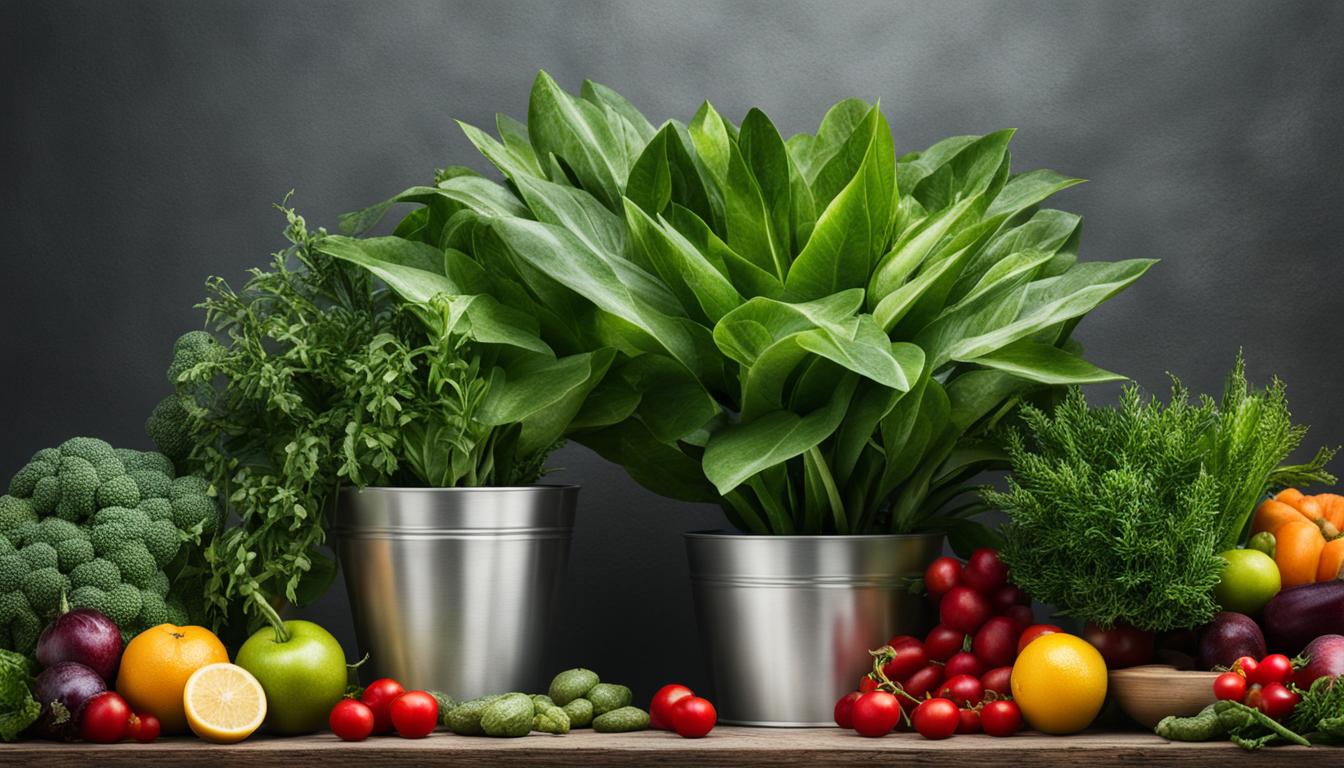
Zinc is an essential trace element for houseplants, playing a vital role in their growth and development. Understanding the zinc needs of your houseplants is crucial to ensure their optimal nutrition and vitality.
Let’s explore the importance of zinc for houseplants, signs of zinc deficiency, zinc absorption in houseplants, treating zinc deficiency, and maintaining zinc levels to keep your houseplants healthy and thriving.
Key Takeaways:
- Zinc is essential for houseplants as it aids in various metabolic processes.
- Signs of zinc deficiency in houseplants include leaf discoloration and stunted growth.
- Houseplants absorb zinc primarily through their roots.
- Treating zinc deficiency can involve foliar sprays and soil amendments.
- Maintaining optimal zinc levels in houseplants requires balanced nutrition and proper soil management.
Importance of Zinc for Houseplants
Houseplants rely on zinc for various essential functions that contribute to their overall growth and vitality. Zinc plays a crucial role in chlorophyll formation, protein synthesis, and the conversion of starch to sugar.
It also helps houseplants tolerate colder temperatures and regulates stem elongation and growth. Without sufficient zinc, houseplants may exhibit symptoms such as chlorosis (yellowing of leaves) and stunted growth.
To ensure that your houseplants receive the necessary amount of zinc, it is important to provide them with proper fertilization and soil management.
This can be achieved by using zinc-rich soils, organic matter, and fertilizers specifically formulated for indoor plants. By maintaining optimal zinc levels, you can promote vibrant foliage, robust growth, and overall plant health.
Benefits of Zinc for Houseplants
- Promotes chlorophyll formation and photosynthesis
- Aids in protein synthesis and sugar production
- Helps houseplants tolerate cold temperatures
- Regulates stem elongation and growth
Providing Zinc to Houseplants
One way to provide zinc to houseplants is through appropriate fertilization. Look for fertilizers that contain zinc as one of the essential nutrients.
These fertilizers are specifically formulated to meet the needs of indoor plants and help prevent zinc deficiency. Additionally, incorporating organic matter into the soil can improve zinc absorption and availability for houseplants.
Preventing Zinc Deficiency
Maintaining proper zinc levels in houseplants is crucial to prevent deficiencies. Regularly monitor your plants for signs of zinc deficiency, such as leaf discoloration and stunted growth.
Conduct a soil test to determine the zinc levels and make necessary amendments based on the results. By addressing zinc deficiencies promptly and providing optimal care, you can ensure the health and vitality of your houseplants.
Signs of Zinc Deficiency in Houseplants
If your houseplants are lacking sufficient zinc, they may display certain signs and symptoms that indicate a deficiency. Recognizing these signs is crucial in addressing the problem and ensuring the health and vitality of your plants.
One common sign of zinc deficiency in houseplants is leaf discoloration. The leaves may develop a yellowing or whitening between the veins, particularly starting from the base of the leaf. This discoloration may progress and spread throughout the entire leaf if the deficiency persists.
In severe cases, the lower leaves of the plant may turn brown or purple and eventually die. This can significantly impact the overall appearance and health of the plant. Therefore, it is important to monitor your houseplants closely for any signs of zinc deficiency and take prompt action to rectify the issue.
Table: Signs of Zinc Deficiency in Houseplants
| Signs | Description |
|---|---|
| Leaf discoloration | Yellowing or whitening between the veins, starting from the base of the leaf |
| Stunted growth | Limited or slow growth compared to healthy plants |
| Leaf deformities | Abnormal growth patterns or malformed leaves |
| Poor fruit or flower production | Reduced or no production of fruits or flowers |
By closely monitoring your houseplants for these signs of zinc deficiency and taking appropriate measures to address the issue, you can ensure that your plants receive the necessary nutrients for their optimal growth and development.
Best Sources of Zinc for Plant Growth
Zinc is an essential nutrient for houseplants, and providing them with the best sources of zinc is crucial for their growth and development. Here are some key sources of zinc that can help ensure optimal zinc absorption in houseplants:
Organic Matter
Addition of organic matter, such as compost or well-rotted manure, to the soil can significantly improve zinc availability for houseplants. Organic matter acts as a natural chelator, enhancing nutrient absorption and retention.
It also helps improve soil structure and fertility, creating an ideal environment for plant roots to access essential nutrients, including zinc.
Zinc-Rich Soils
Using zinc-rich soils specifically formulated for indoor plants can provide a direct and reliable source of zinc for your houseplants. These soils are often enriched with micronutrients, including zinc, to ensure optimum plant growth and nutrient uptake.
Look for potting mixes or soils labeled as zinc-rich or formulated for indoor plants to provide your houseplants with a consistent supply of zinc.
Fertilizers
Applying fertilizers with a balanced nutrient composition, including zinc, can help meet the zinc requirements of your houseplants. Look for fertilizers specifically formulated for indoor plants or those that contain micronutrients, such as zinc.
Follow the manufacturer’s instructions for application rates and frequency to avoid over or under-fertilization, which can negatively affect plant health.
By providing houseplants with these best sources of zinc, you can ensure they receive the necessary nutrients for healthy growth and vitality. Remember to monitor your plants for signs of zinc deficiency and adjust your fertilization routine accordingly.
A balanced and nutrient-rich growing environment is key to maintaining optimal zinc levels and promoting the overall health of your houseplants.
Treating Zinc Deficiency in Houseplants
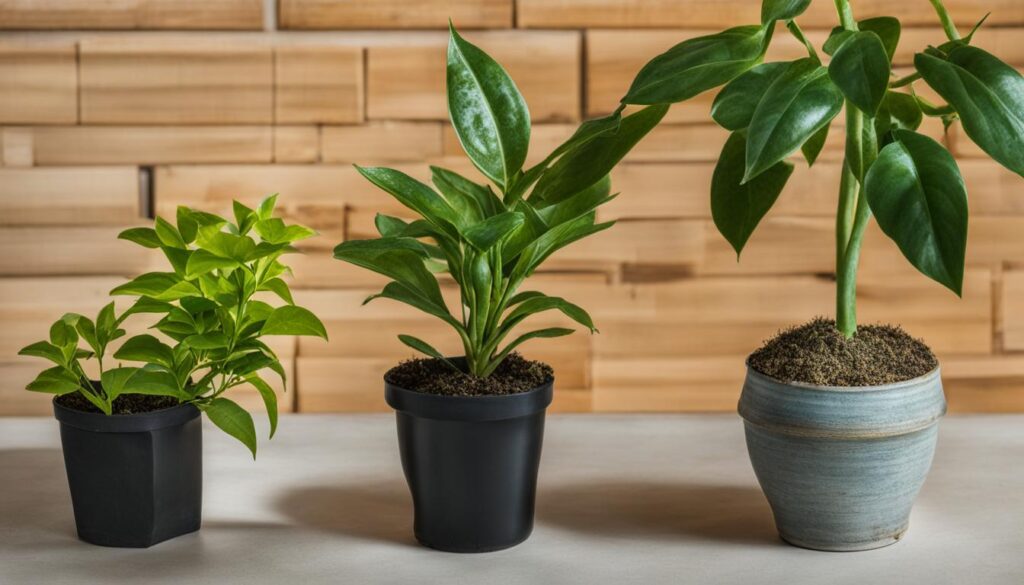
If you suspect a zinc deficiency in your houseplants, it is important to take immediate action to address the issue. Confirming the deficiency through a soil test conducted by your cooperative extension agent is recommended. While waiting for the results, there are some quick fixes that can help alleviate the symptoms of zinc deficiency.
One option is to use a foliar spray that contains zinc or kelp extract. These sprays provide an immediate supply of zinc to the plants, which can help improve their overall health. Simply spray the solution onto the leaves of the affected plants, ensuring complete coverage. Repeat this treatment every few weeks as needed.
However, it is important to note that foliar sprays only provide temporary relief and do not address the root cause of the deficiency. To effectively treat zinc deficiency in houseplants, it is essential to amend the soil based on the recommendations from the soil test.
This may involve working chelated zinc into the soil and adding organic matter to improve zinc absorption and availability for the plants.
Zinc Deficiency Treatment Methods:
- Confirm the deficiency through a soil test conducted by a cooperative extension agent
- Use a foliar spray that contains zinc or kelp extract for immediate relief
- Amend the soil based on the soil test recommendations by working chelated zinc into the soil and adding organic matter
| Zinc Deficiency Symptoms | Treatment Options |
|---|---|
| Leaf discoloration, yellowing between veins | Use foliar sprays with zinc or kelp extract |
| Stunted growth | Amend soil with chelated zinc and add organic matter |
| Brown or purple lower leaves | Improve zinc absorption and availability in the soil |
Maintaining Zinc Levels in Houseplants
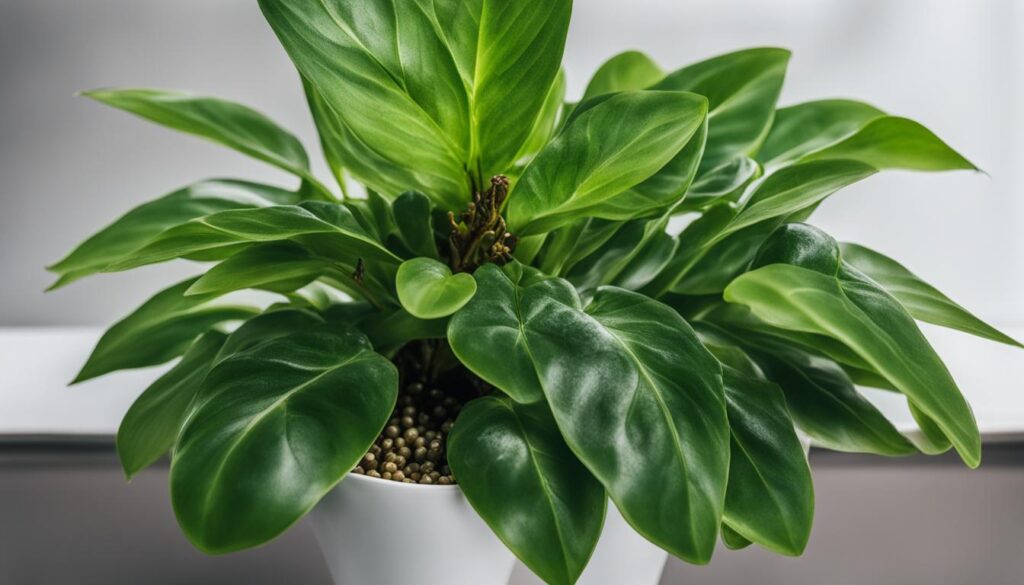
To maintain optimal zinc levels in houseplants, it is important to provide them with a balanced and nutrient-rich growing environment. This includes using zinc-rich soils, organic matter, and fertilizers specifically formulated for indoor plants.
It is also important to avoid overwatering, as waterlogged soil can lead to zinc deficiency. Additionally, monitoring the pH balance of the soil and avoiding high-phosphorus fertilizers can help ensure proper zinc absorption and availability for houseplants.
One of the best sources of zinc for plant growth is through the use of zinc-rich soils. These soils naturally contain higher levels of zinc, providing plants with a readily available source of the nutrient.
Incorporating organic matter into the soil can also help increase zinc absorption, as organic matter acts as a natural chelator, making zinc more accessible to the plants.
When it comes to fertilization, using a specialized zinc fertilizer formulated for indoor plants can help meet their zinc needs. These fertilizers are typically enriched with zinc, ensuring that the plants receive an adequate supply of the nutrient.
It is important not to over-fertilize, as excessive zinc can lead to toxicity in houseplants. Following the recommended application rates and frequency is crucial to maintaining the right balance.
Key Points:
- Provide houseplants with a balanced and nutrient-rich growing environment.
- Use zinc-rich soils and incorporate organic matter to enhance zinc absorption.
- Avoid overwatering and ensure proper pH balance in the soil.
- Use specialized zinc fertilizers formulated for indoor plants, following recommended application rates.
| Signs of Zinc Deficiency | Causes of Zinc Deficiency |
|---|---|
| Leaf discoloration | Low zinc availability in the soil |
| Yellowing between leaf veins | High soil pH |
| Stunted growth | Excessive phosphorus in the soil |
Ensuring Healthy Houseplants with Zinc
As a plant enthusiast, I understand the importance of meeting the zinc needs of my houseplants. Zinc plays a vital role in their overall health and well-being, contributing to their growth and development.
By ensuring that my houseplants receive the proper amount of zinc, I can promote vibrant foliage, robust growth, and overall plant vitality.
Regularly monitoring my plants for signs of zinc deficiency is key to maintaining their health. I keep an eye out for any leaf discoloration, especially yellowing between the veins or browning and purple coloring.
These are typical symptoms of zinc deficiency and indicate that my plants may require additional zinc supplementation.
To address any potential deficiencies, I regularly conduct soil tests with the guidance of my cooperative extension agent. These tests provide valuable insights into the nutrient content of the soil, including zinc levels.
Based on the results, I can amend the soil with chelated zinc and organic matter to improve zinc absorption and availability for my houseplants.
In addition to soil amendments, I also ensure that my houseplants receive proper fertilization with zinc-rich formulas specifically formulated for indoor plants.
By providing them with the best sources of zinc, I can ensure that they have access to this essential nutrient for various metabolic processes, chlorophyll formation, and growth regulation.
FAQ
What are the zinc needs in houseplants?
Zinc is an essential trace element for houseplants as it plays a vital role in their growth and development. It helps in the production of chlorophyll, which is necessary for photosynthesis.
What is the importance of zinc for houseplants?
Zinc is crucial for houseplants as it aids in various metabolic processes. It is necessary for chlorophyll formation, protein synthesis, and the conversion of starch to sugar. Zinc also helps houseplants tolerate cold temperatures and promotes proper stem elongation and growth regulation.
What are the signs of zinc deficiency in houseplants?
Common signs of zinc deficiency in houseplants include leaf discoloration, particularly yellowing between the veins, starting from the base of the leaf. In severe cases, the lower leaves may turn brown or purple and die.
How do houseplants absorb zinc?
Houseplants absorb zinc primarily in the form of divalent ionic zinc (Zn2+) and chelated-zinc. The availability of zinc in the soil is influenced by factors such as soil temperature, pH balance, and the presence of other nutrients.
How can I treat zinc deficiency in houseplants?
If you suspect a zinc deficiency in your houseplants, you can apply a quick fix by spraying your plants with a foliar spray that contains zinc or kelp extract. These sprays provide immediate zinc to the plants and can help alleviate the deficiency symptoms. However, it is essential to address the root cause of the deficiency by amending the soil based on the soil test recommendations.
How can I maintain zinc levels in houseplants?
To maintain optimal zinc levels in houseplants, it is important to provide them with a balanced and nutrient-rich growing environment. This includes using zinc-rich soils, organic matter, and fertilizers specifically formulated for indoor plants. It is also important to avoid overwatering and monitor the pH balance of the soil.
How can I ensure healthy houseplants with zinc?
By understanding and addressing the zinc needs of your houseplants, you can ensure their healthy growth and vitality. Regularly monitoring your plants for signs of zinc deficiency, conducting soil tests, and providing appropriate fertilization and soil amendments can help maintain optimal zinc levels.

